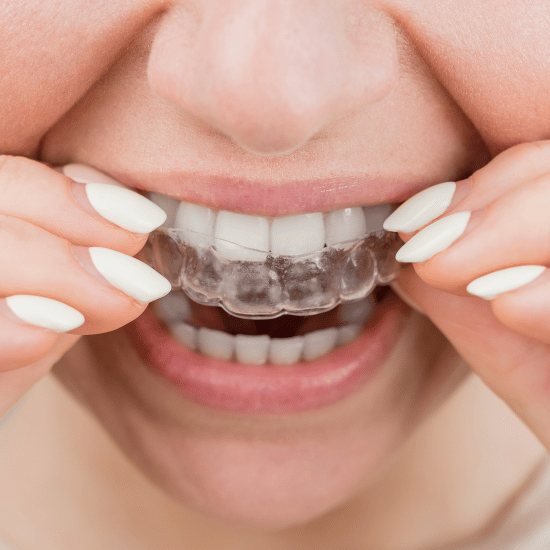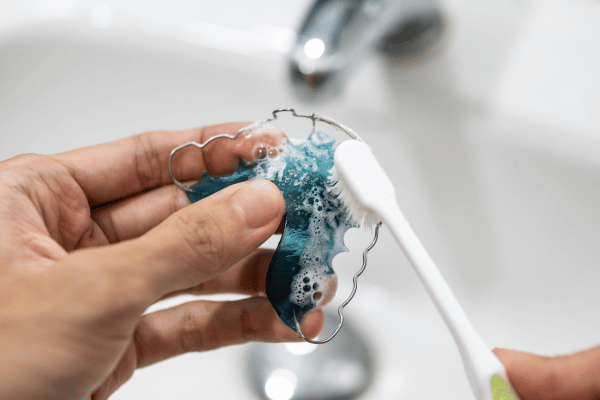Getting your braces off is a huge accomplishment for people going through orthodontic treatments. You’ve gone through months, maybe even years, of adjustments, tightness, and having to say no to some of your favorite snacks. But the journey to a straight and beautiful smile isn’t over the moment those braces come off. You’re onto the next phase, dental retainers, the phase that ensures your smile stays intact. This part of your dental journey is crucial, ensuring that all the hard work done by braces doesn’t go to waste. In this guide, we’ll dive into what retainers are, why they’re so important, How long you have to wear retainers.
What Are Retainers?
After braces have done their job of aligning your teeth, retainers help keep everything in its new, correct position.
“It’s essential to follow your orthodontist’s guidance on retainer wear to maintain your straightened teeth and protect your investment. If you fail to wear your retainer as instructed it could lead to the gradual shifting of your teeth.” -Dr. Athar
Find out more in the podcast by Dr Ather:
The Purpose of Retainers
The main goal of a retainer is to hold your teeth in place. After removal of braces, your teeth can shift back to their original positions, a process called relapse. Retainers prevent this, making sure that your teeth stay straight and your smile stays beautiful.
Types of Retainers

There are mainly two types of retainers: fixed and removable. Fixed retainers are bonded to the back of your teeth, invisible from the outside, and you wear them all the time. Removable retainers can be taken out when you eat or brush your teeth. They come in two styles: the Hawley retainer, made of metal wires and acrylic, and the clear plastic retainer, which looks like a thin, invisible mouthguard.
Choosing the right type of retainer depends on your individual needs and the recommendation of your orthodontist. Each type has its advantages, and your orthodontist will guide you in selecting the one best suited to keeping your smile in place.
Why Retainers Are Important
Wearing a retainer is the only way to keep your teeth in their new position after braces. It’s a crucial step in the orthodontic process, ensuring your time, effort, and investment in braces pay off in the long term. Without a retainer, your teeth can quickly begin to drift back to their original positions, undoing all the work your braces did.
It’s there to protect and maintain the alignment of your teeth, ensuring that your braces’ hard work lasts a lifetime. Just as you took care of your braces, you’ll need to take care of your retainer, keeping it clean and wearing it as directed by your orthodontist.
Factors Influencing Retainer Wear Duration
You might be wondering, how long do you have to wear retainers? Well, the answer isn’t the same for every individual. Several factors can influence how long you need to wear your retainer, making this phase as unique as your smile.
Your Orthodontic Needs
First and foremost, the specifics of your dental alignment play a big role. If your teeth were more crowded before braces, you might need to wear your retainer longer than someone whose teeth were just slightly misaligned. Your orthodontist, who knows your teeth’s history better than anyone, will give you a tailored timeline based on how complex your case was.
Type of Retainer
Remember the two main types of retainers we mentioned earlier? Whether you have a fixed retainer glued discreetly behind your teeth or a removable one you can take out has a say in your retainer timeline. Fixed retainers might be a forever commitment, offering continuous support. Removable ones, on the other hand, might start as a full-time job but gradually shift to just night-time wear.
Age and Growth
Your age can also influence how long you need to wear your retainer. Younger people, still growing, might need to keep their retainers in check longer to counteract any natural changes that might try to undo the braces’ hard work.
After the Braces Come Off
Right after your braces come off, your orthodontist will likely recommend wearing your retainer all the time, except when eating or brushing your teeth. This period is crucial because your teeth are most likely to shift back to their original positions soon after the braces are removed.
General Guidelines for Retainer Wear

Despite these variables, there are some general guidelines you can follow. These instructions are given by your orthodontist based on your individual smile.
Immediate Post-Treatment Period
In the first few months after your braces are removed, it’s a full-time commitment to your retainer. Think of it as the final, crucial phase of your orthodontic treatment. Your teeth are getting used to their new positions, and the retainer is their guide.
Long-Term Use
After the initial period, you might be able to reduce how often you wear your retainer. Many orthodontists suggest shifting to nighttime wear only. However, this doesn’t mean you’re off the hook completely. Nighttime retainer use might be a lifelong commitment to ensure your teeth stay in place.
Retainer Duration
If you’re wondering, how long do you have to wear retainers after braces? Or how long do you have to wear retainers after invisalign? Then keep in mind that your retainer might be a longer-term companion than you initially thought. While some people might only need to wear their retainer full-time for a few months, transitioning to less frequent use, the idea is to make wearing your retainer a part of your routine. Like brushing your teeth or washing your face, it becomes just another part of your daily self-care regimen.
Tips for Managing and Caring for Your Retainer
Taking care of your retainer is just as important as wearing it. Here’s how to ensure it stays in top shape, doing its job to keep your smile perfect.
Cleaning and Maintenance
Keep your retainer clean to avoid bad smells and bacteria buildup. If you have a removable retainer, rinse it every time you take it out and clean it daily as recommended by your orthodontist. Fixed retainers require diligent flossing and brushing around the wires.
Dealing with Discomfort
New retainers might feel strange or even slightly uncomfortable at first. Give it time, and soon you won’t even notice it’s there. If discomfort persists, talk to your orthodontist. Never try to adjust your retainer yourself; you could end up shifting your teeth in ways you don’t want.
Lost or Damaged Retainers
What happens if you lose your retainer or damage it, contact your orthodontist immediately. The longer you go without it, the more likely your teeth will start to wander from their aligned positions.
The Importance of Consistency and Follow-Up
Your journey to maintaining that perfect smile hinges on two crucial behaviors: consistency in wearing your retainer and keeping up with your orthodontist appointments. These practices ensure that your teeth remain in their ideal positions and that any minor issues can be addressed before they become bigger problems.
Why Consistent Wear is Crucial
Initially, wearing your retainer might seem like a lot, but integrating it into your daily routine makes it second nature. Remember, your teeth have memory, and without the constant reminder from your retainer, they can shift back to their original positions, undoing all your hard work. Whether your orthodontist recommends wearing your retainer all day or just at night, sticking to this schedule is key.
The Role of Regular Orthodontic Check-Ups
Think of your orthodontist as the coach in your post-braces journey. Regular check-ups allow them to monitor your progress, make any necessary adjustments to your retainer, and ensure that your teeth stay in line. These appointments are also the perfect opportunity to address any concerns or questions you might have about your retainer or oral health in general.
Skipping these appointments might seem harmless, but it can lead to unnoticed shifts in your teeth’s alignment, potentially requiring further orthodontic treatment down the line. So, keeping these appointments is just as important as wearing your retainer itself.
Adjustments and Replacement: Keeping Your Retainer in Good Shape
Over time, your retainer may wear down or no longer fit as well as it once did. This is normal, but it requires action. During your check-ups, your orthodontist can determine if your retainer needs adjusting or replacing. A well-fitting retainer is crucial to maintaining your teeth’s alignment, so don’t delay in addressing any fit issues.
Furthermore, as your body changes, so too can your mouth and teeth, even into adulthood. Growth, aging, and other factors can affect the fit and effectiveness of your retainer, making those regular orthodontic visits all the more critical.
Maintaining Oral Hygiene
Good oral hygiene is very important with braces and especially for retainer wearers. Brush and floss diligently, and clean your retainer regularly to prevent bacteria build-up. For removable retainers, gentle brushing with toothpaste and a soft-bristled brush can keep them clean and odor-free. Fixed retainer wearers should invest in floss threaders to navigate around wires effectively.
Final Thoughts
To sum it up, it’s clear that wearing a retainer is a long-term commitment, but one that plays a huge role in maintaining your beautiful smile. Consistency, regular check-ups, and proper care for your retainer are non-negotiable elements of this phase. Facing and overcoming the common challenges associated with retainer wear are part of the journey. Remember, the goal is to preserve the smile you’ve worked so hard to achieve. With diligence, patience, and a positive attitude, you can keep your smile shining bright for years to come.
FAQs
1. How long do I really need to wear my retainer?
It depends on your unique case, but generally, you’ll wear it full-time for several months and then at night indefinitely to ensure your teeth stay put.
2. Can I just wear my retainer at night?
After an initial period of full-time wear, most people can switch to wearing their retainers just at night. However, follow your orthodontist’s advice for the best outcome.
3. What if my retainer starts to feel uncomfortable?
If your retainer becomes uncomfortable or doesn’t fit right, see your orthodontist as soon as possible. You might need an adjustment or a new retainer.
4. How do I clean my retainer?
Clean your removable retainer with lukewarm water and gentle soap or a retainer cleaner. Avoid hot water, as it can warp the retainer. Fixed retainers should be carefully brushed around during your oral hygiene routine.
